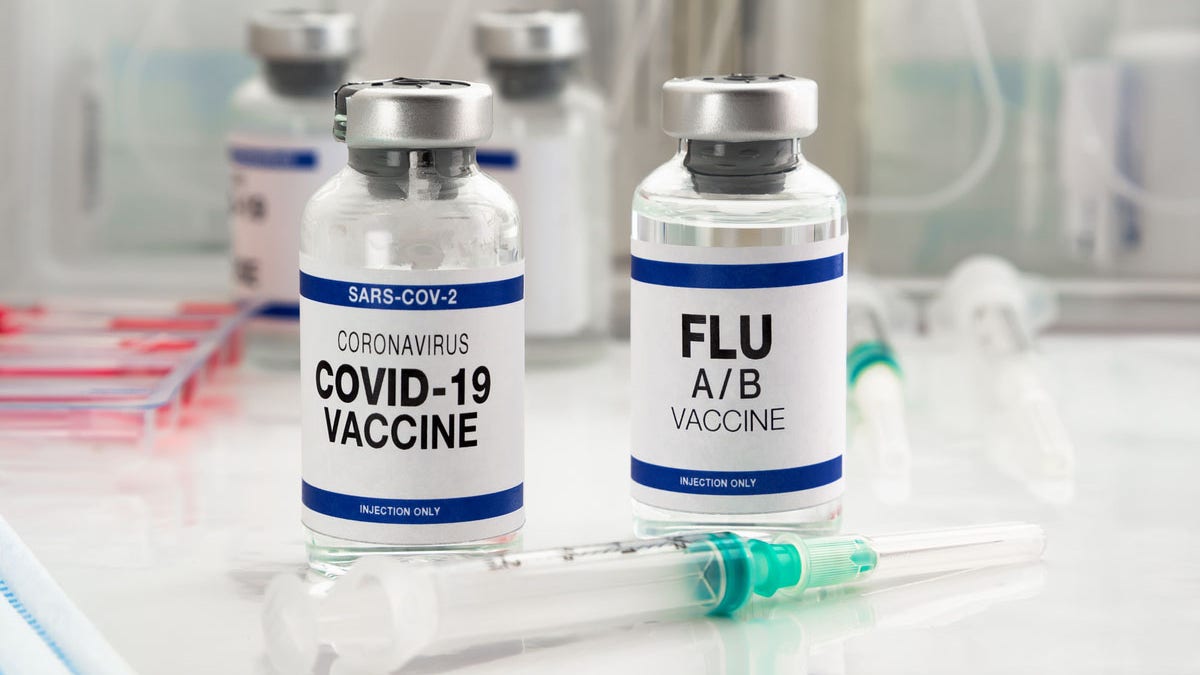Join Fox News for access to this content
You have reached your maximum number of articles. Log in or create an account FREE of charge to continue reading.
By entering your email and pushing continue, you are agreeing to Fox News' Terms of Use and Privacy Policy, which includes our Notice of Financial Incentive.
Please enter a valid email address.
Everyone 6 months and older is advised to get the updated 2024-2025 COVID-19 vaccines and the updated 2024-2025 flu vaccines, according to the latest guidance from the U.S. Centers for Disease Control and Prevention (CDC).
With September and October widely considered the best times to get vaccinated for flu and COVID-19, some may wonder whether it’s OK to get both shots at the same time.
The CDC states on its website that "it is safe to receive COVID-19 and flu vaccines at the same visit."
VACCINE EXEMPTIONS ARE RISING AMONG KINDERGARTENERS, CDC REPORTS
The advantages are particularly key for young children, the agency noted.

Everyone 6 months and older is advised to get the updated 2024-2025 COVID-19 vaccines and the updated 2024-2025 flu vaccines, according to the latest guidance from the CDC. (iStock)
"Giving several shots at the same time means fewer office visits," the CDC states. "This saves parents time and money, and can be less traumatic for the child."
Dr. Marc Siegel, senior medical analyst for Fox News and clinical professor of medicine at NYU Langone Medical Center, agrees that it’s OK to get both at the same time — but he prefers to do them separately.
NASAL SPRAY FLU VACCINE GETS FDA APPROVAL FOR HOME USE: ‘A GOOD ALTERNATIVE’
"My personal taste on this as a practicing internist is I tend to separate them, only because I want to know which is causing which side effects, so I can monitor it," he told Fox News Digital.
"But for people who say, ‘I'm only going to the pharmacy once, is it safe to have them together?’, the answer is absolutely yes."

"I tend to separate them, only because I want to know which is causing which side effects so I can monitor it," one doctor told Fox News Digital. (iStock)
Dr. Jacob Glanville, CEO of Centivax, a San Francisco biotechnology company, recommends that people get both vaccines at the same doctor’s or pharmacist’s visit.
"Studies have shown that co-administering flu and coronavirus vaccines makes them work about as effectively as administering them separately," he told Fox News Digital.
CLICK HERE TO GET THE FOX NEWS APP
Glanville said he personally gets both vaccines at once for two reasons — "because of the science and for convenience."
"I didn’t feel that the logistical nuisance was worth the wait for me personally, and would rather get it over with on a single vaccine day than having to schedule multiple visits," he said.

"Giving several shots at the same time means fewer office visits," the CDC states. "This saves parents time and money, and can be less traumatic for the child." (iStock)
This also allows patients to have faster vaccine coverage against both pathogens, Glanville noted.
"Even if you are someone who might experience some side effects from a vaccine, I prefer to combine them."
CLICK HERE TO SIGN UP FOR OUR HEALTH NEWSLETTER
Beth Battaglino, CEO of HealthyWomen and a registered nurse in New Jersey, agrees that getting updated COVID-19 and flu vaccines together, at the same visit, is a safe and common practice known as "coadministration."
"Even if you are someone who might experience some side effects from a vaccine, I prefer to combine them."
"This is a convenient way to stay protected while avoiding multiple trips to your doctor or pharmacy," she told Fox News Digital.
For more Health articles, visitwww.foxnews.com/health
"Vaccination remains the best way to prevent severe illness, especially for high-risk groups like older adults and those with underlying health conditions."